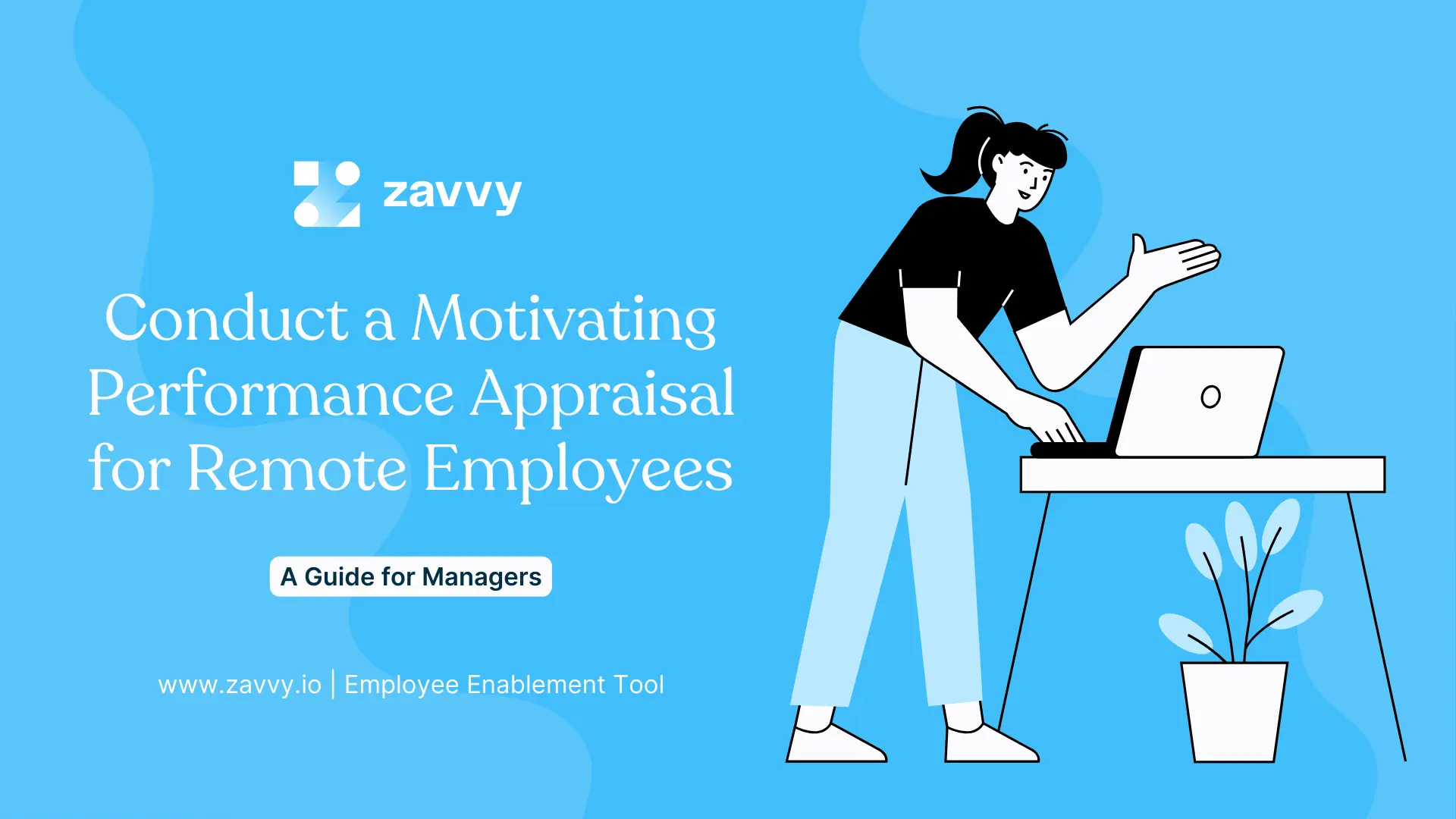
How to Use Self-Evaluation Questions to Motivate Employee Growth (75 Sample Questions Included)
Zuletzt aktualisiert:
4.1.2024
Lesezeit:
7 minutes
última actualización
4.1.2024
tiempo de lectura
7 minutes
Last updated:
January 4, 2024
Time to read:
7 minutes

Self-evaluation is one of the cornerstones of a successful, all-encompassing feedback system in a modern workplace.
Feedback helps reflect our blind spots and areas of growth. With a solid feedback system in place, employees are continuously learning and evolving. Without it, they stay stagnant, resulting in lower employee satisfaction and revenue.
Traditionally, feedback translates into a strictly downward flow of manager-employee evaluation. However, modern feedback takes a 360 perspective: upward, downward, peer, and self-evaluation. This paints a more accurate picture of the person.
This article will go in-depth into self-evaluation questions. You will find:
- How to create a self-assessment questionnaire.
- Examples of self-evaluation questions for employees and leaders, 75 in total.

↩️ What are self-evaluation questions?
Self-evaluation questions can be a guide to help the employees reflect on their growth. A self-evaluation is a critical component of a 360 degree feedback cycle. It helps assess:
- Where your employees' strengths and weaknesses lie.
- How these translate into certain behaviors in a given situation.
- What positive behavioral changes can be made (to be discussed with the manager).

The self-evaluation process can be perceived as motivational or discouraging, depending on the employee's personality. Therefore, self-evaluation should always end with a discussion of the outcome with a team leader or manager.
Tip: If you notice that an employee is overly critical of themselves, encourage them to make a list of positives too.

The role of feedback
Feedback encourages employee growth and helps align employees with their ideal career path. And what gets systemized gets done!
New and well-seasoned employees can benefit from regular feedback checkups.
Properly implemented, feedback is motivating. However, demotivated employees and employee burnout can be warning signs of the feedback system not working as intended.
Tip #1: If feedback is a stressor at your workplace, you may want to allocate extra resources to boost the feedback system.
Tip #2: Systemizing feedback is the foundation of making it a natural part of the career journey. We highly recommend including some self-evaluation questions to encourage ownership and self-reflection.
🔍 Types of self-evaluation questions
Before we move on to the questions, here are the different categories of self-evaluation questions.

For employees:
- Performance-review questions: Look at the past and what the employee has achieved vs. the goals.
- Growth and development: Look at the future where the employee wants to grow.
- Start/stop/continue: Assess what behaviors they want to start, stop and keep doing.
- Values/behavior: Estimate whether they were acting in alignment with company values.
- Social/soft skills – Evaluate their soft skills and how they work within the group.
- Job/role related – Determine what they'd like to do more or less of and how well their daily tasks match the job description.
- Goals – Review goals and (broadly) how they plan on achieving them.

For managers:
- Knowledge of employees' strengths and weaknesses – Knowing each team member is critical to get the right person at the right place.
- Communication with the team – What works well and where there's room for improvement.
- Your ability to motivate – A critical skill as a manager or team leader.
- Collaboration within the team – What works smoothly and how to improve what doesn't.
- Performance management – How to support your employees in reaching their goals and the ones of the company.
- Your career development – Where you see yourself heading.
- Performance – Assessment of your performance during the last evaluation period.
- Behavior and value – Whether you've acted in the spirit of company values.
📝 How to create a self-assessment questionnaire?
The next natural question is: how do I create a self-assessment questionnaire?
- One essential ingredient is the survey length. If it's too short, you can miss out on crucial points. However, if it's too long, it can create resistance and negatively impact employee morale.
- The frequency of the employee evaluation process, including self-evaluation,
- The types of questions matter – use a mix of retrospective questions reviewing the accomplishments in the last period and future-oriented ones to evaluate goals for the coming period.
Tip: Use these points as guidelines. You will find the perfect employee self-evaluation survey for your workplace by trying and testing different formats.

❓ 43 Self-assessment questions for your employees
Here's an extensive list of employee self-evaluation questions – for personal growth and professional development:
Performance-review questions
- Do you feel you have been successful during the last evaluation period?
- What are your most significant achievements during the last period? / What are three things you did well recently?
- What are you most proud of?
- How have you delivered compared to the goals on a scale of 1-10? Why?
- How do you think you have contributed toward the company goals?
- Where did you fall short of meeting the goals, and why?
- What would have helped you reach those goals?
- Are you performing work tasks outside of the job description? If so, which and why?
Growth and development
- Where do you think your skills would add the most value?
- Do you feel you spend enough time on professional development? Why/why not?
- Mention three ways in which you have grown professionally during the last period.
- What specific skills would you like to develop in the coming period?
- How are you committed to developing these skills?
Start/stop/continue
- What do you intend to start doing in the coming period?
- What do you intend to stop doing in the forthcoming review period?
- What do you intend to continue doing in the coming period?
Values/behavior
- Do you feel that you have acted according to the company values? Why/why not?
- How do you respond to constructive criticism?
- How motivated are you to perform your responsibilities?
- How do you estimate your work ethic?
- Did you ask for help when needed? If not, why not?
Social/soft skills
- How well do you think you collaborate on a scale of 1-10?
- Are you happy with the way you communicate? Why/why not? If not, how are you committed to improving your communication?
- How do you react when facing a conflict or misunderstanding? How would you want to respond?

Job/role related
- What would you like to do more of?
- What would you like to do less of?
- How do you estimate your time management skills on a scale of 1-10? If less than 10, what would it take for it to be a 10?
- Do the tasks you perform on a typical day match the job description?
- Are you interested in becoming a leader? If yes, what are the top 3 skills you would need to develop?
- How do you evaluate your problem-solving skills?
Goals
- Mention your top 3 goals for the coming period.
- What is one action per goal that you are committed to taking today?
💼 32 Self-assessment questions for your managers and leaders
Self-evaluation questions for leaders in the company are essential for several reasons:
- As a manager, you want to practice what you preach. Employee motivation toward self-assessment can drop if they notice that the managers and upper management aren't required to participate.
- The team is only as strong as its weakest player – make sure it's not you! Personal self-evaluation questions give additional guidance on how to excel as a leader besides manager reviews.
- Regular self-assessment encourages a culture of humility and respect, regardless of seniority level.
Here are some questions to create your manager self-assessment questionnaire.
Knowledge of employees' strengths and weaknesses
- On a scale of 1-10, how well do you know your team members?
- Describe a situation where you leveraged a skill or talent of an employee to increase performance.
- Are there any employees in particular that you know less than others? How can you learn more about them?
- Are you considering each team member's strengths when assigning responsibilities for a project? If not, how can you start to do it?
Communication with the team
- How often do you check in with your team?
- Do you tend to down-prioritize team meetings in favor of other commitments? If yes, how do you think it affects team productivity?
- How would you describe your communication style?
Ability to motivate
- Do you regularly praise employees for outstanding work and celebrate wins?
- Do you focus on the positive aspects or constructive criticism when you give feedback? How can you balance the two?
- Do you know what motivates each employee in your team?
- How has the overall motivation been within the team during the last evaluation period? Has it changed recently, and if so, why?
- How do you react when facing employee burnout?
Collaboration within the team
- How well do your team members work on a scale of 1-10?
- If less than 10, what would it take for it to be a 10?
- Is teamwork characterized by harmony or conflict?
- Do you coach your team members through roadblocks?
Performance management
- How often do you give your employees feedback?
- Are regular feedback reviews part of the workflow?
- Do you feel the feedback given in the last period motivated or disheartened your employees?
Personal career development
- Where do you see yourself in five years?
- What do you enjoy most/least about your job?
- What skills are you looking to develop next?
Performance
- How satisfied are you with your performance in the last period on a scale of 1-10?
- What actions are you committed to taking to elevate/keep that number?
- Mention a situation where you didn't meet a goal and why.
- Mention a situation where you exceeded a goal and why.
Behavior and values
- Are your behavior and leadership style in alignment with company values?
➡️ Help your employees go from dreading to desiring feedback with a sample of self-evaluation examples. We curated 60 self-evaluation examples to help you and your team.
➡️ Build a culture of ownership and self-reflection with Zavvy
If you haven't worked with feedback before, a platform like Zavvy takes out the overwhelm for both you and your team members.
Create a culture of growth and constructive feedback with Zavvy. Zavvy helps you streamline the feedback process and make it a natural part of your workday.
With a few clicks, you can adapt the feedback to different staff groups, like employees in general and managers.

Read next
Als Nächstes lesen
No items found.
No items found.
.png)





















.png)
























